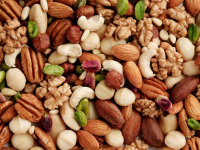How often have you promised yourself you’re going to overhaul your lifestyle, only to find a week or two later that you’re back where you started?
Change can be hard to maintain and lapses are inevitable. It’s how you deal with it that is important. Part of the reason we often feel like we are failing when it comes to lifestyle change is because we put too much pressure on ourselves to be ‘perfect’. So we set unattainable goals and, all too often, one slip can mean a fall.
So try a different approach. Ditch the extreme diets and the quick fixes and make changes gradually, acknowledging that you don’t have to be perfect all the time. Learn from your lapses and focus on consistent, long-term behaviours. This could help you to make changes for life and reap the long-term benefits.
1. Don’t get obsessed with the scales
For many of us, the goal of our diet and lifestyle is to lose weight. Our feelings about our weight are often complicated, because they can be tied up in views of our own attractiveness and self-worth. This can make weight and what you eat an emotionally loaded issue. Try to start with the facts instead: check what your healthy weight with our BMI calculator. Even if you don’t achieve an ‘ideal’ BMI, reducing your weight by just 10 per cent could still have significant benefits to your health.
If your weight is going in the right direction, don’t base your sense of success or failure on whether you have lost a specific amount of weight per week. A downward trend over time is what matters, no matter how long it takes. If you are eating healthily, staying active and sticking to it, then the weight loss will come. Losing less than the recommended 1–2lb (0.5–1kg) a week, for example half a pound a week (about 250g) may not seem significant, but keep it up and this time next year you will be around two stone (13kg) lighter.
Even if you feel the scales don’t reflect the hard work you are putting in, don’t be disheartened or give up. While your weight might not be dropping, you may still be benefiting from the changes in other ways – such as lower cholesterol and blood pressure, or better blood sugar control if you have diabetes. Keep a food diary to make sure you are sticking to your plans and keep going.
2. Small changes add up to a big difference
ur eating habits evolve over time, so making a lot of big changes at once can make it hard to keep going when things get tricky, such as on holiday, during a busy week, or if a new recipe goes wrong. It’s easy to fall back into old habits.
Instead, look for small tweaks that you can make without much effort – such as having low-fat milk instead of whole milk, sugar-free versions of drinks, unsaturated fats instead of butter or ghee, and try using a smaller plate and bowl to reduce your portion sizes. When you are cooking, use a spoon to measure out oil rather than just pouring it straight into the pan – each tablespoonful adds about 100kcals to your dish, so cutting back can make a real difference over time.
The little things we do every day can sometimes be the hardest to change. If you take sugar in your tea, for example, give yourself time to make a change by breaking it down into small steps. Reduce it by a quarter of a teaspoon at a time and the taste change won’t be so dramatic, so you’re more likely to stick with it. Likewise, changing from semi-skimmed to one per cent milk might be easier than going straight to skimmed milk.
3. Worry less about big events
We often worry about slipping up at meals out, parties, birthdays and weddings. But unless these happen on a regular basis, the big occasions won’t make much difference. Denying yourself a piece of cake at the occasional birthday party won’t achieve that much – it’s more important that your diet is healthy most of the time.
Some people follow the 80:20 rule, taking the view that if you eat well at least 80 per cent of the time then it’s OK if things go awry up to 20 per cent of the time. It’s not an evidence-based rule and it doesn’t mean you should deliberately go off-plan 20 per cent of the time, but it could be helpful if you are prone to 'all or nothing’ thinking.
One unhealthy meal doesn’t matter, unless it leads to another. Chalk it up to experience and go back to your plans for the rest of the day. But you can still try to make changes, to make your meal a better choice and help you feel like you’ve stuck to your plans as best you could.
Swap your side dishes – ask if you can have salad or a jacket potato instead of chips, for example. You might be able to ask for wholegrain versions of starchy foods such as bread, rice and pasta. Check that there is a serving of salad or vegetables with your meal (or choose a salad as a starter) to help fill you up and contribute to your 5-a-day. The vegetarian option might be the healthiest choice if it has plenty of vegetables or pulses in it, but steer clear if it’s a cheesy pasta or pastry dish.
Think about how full you are and stop eating when you’ve had enough. If you are worried about waste, ask to have your leftovers boxed up so you can enjoy them the following day.
Source: https://www.bhf.org.uk/


